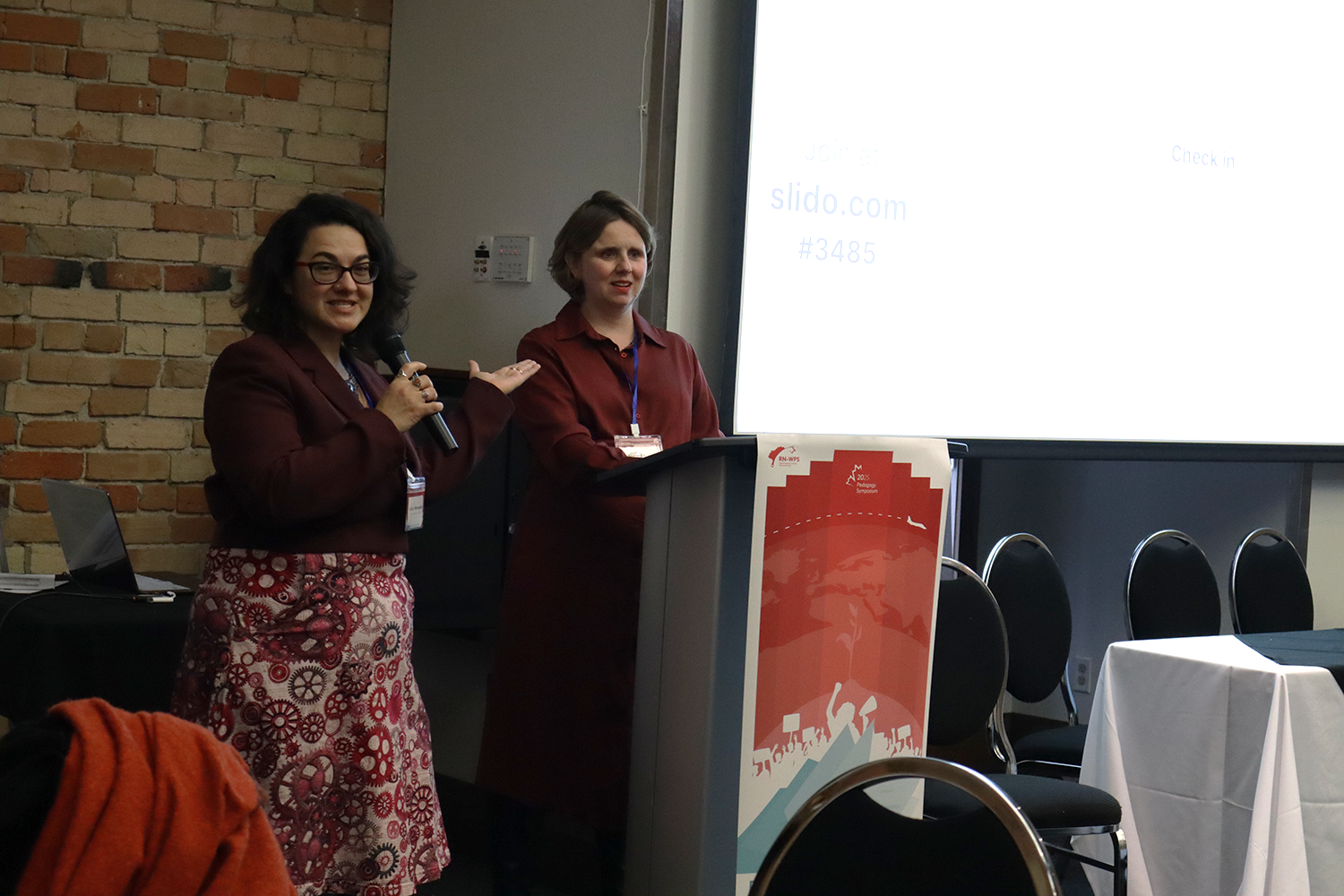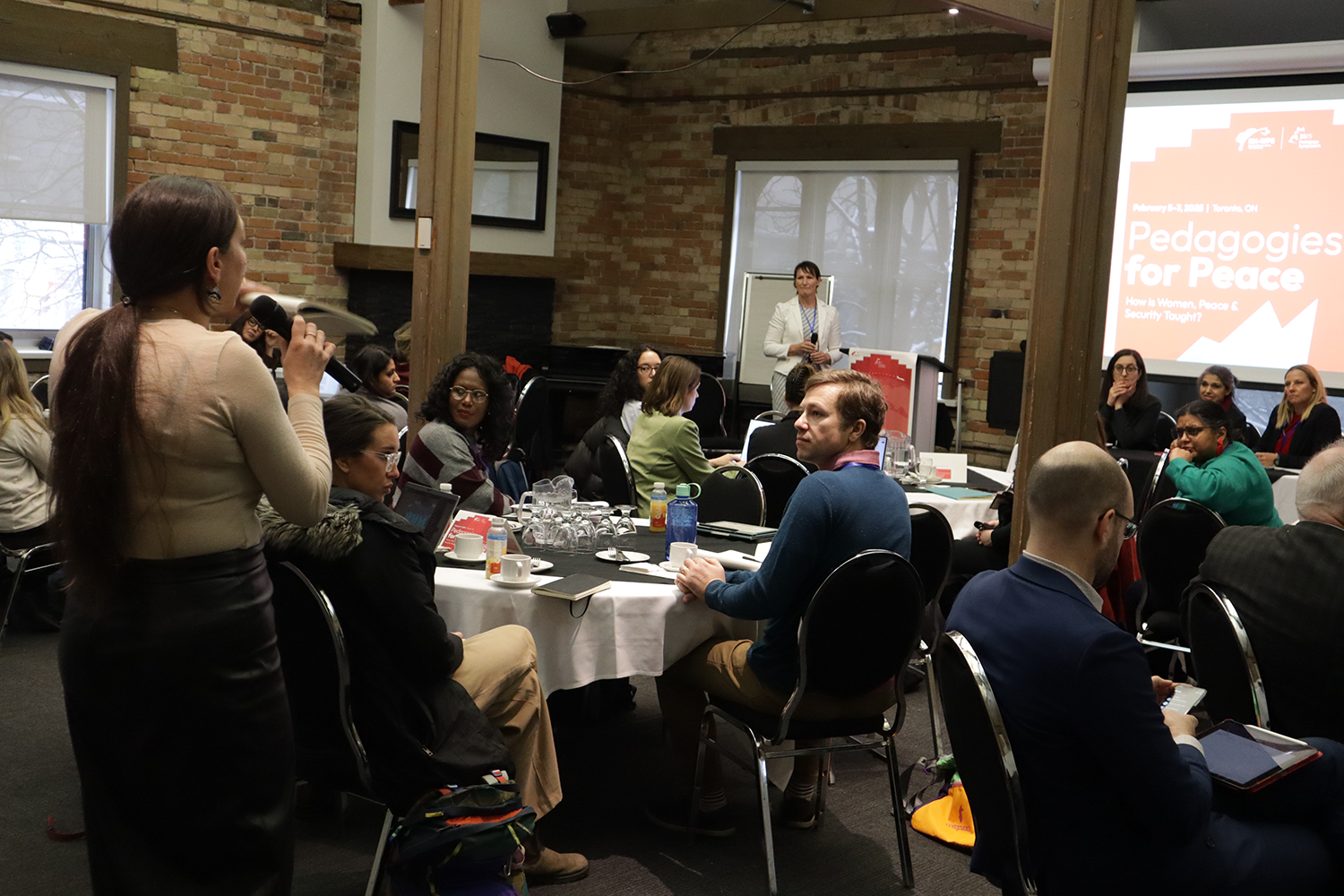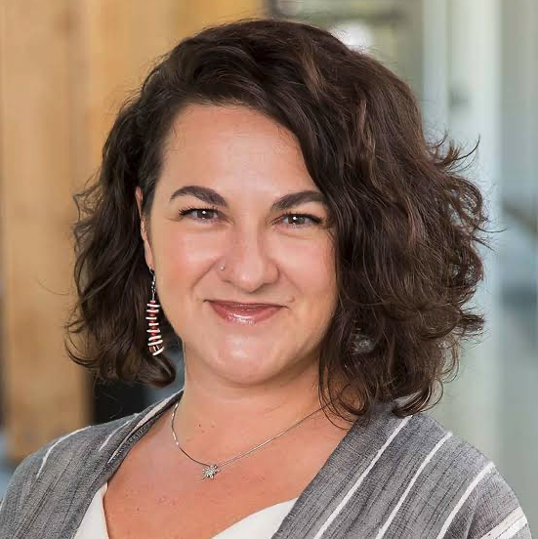
Pedagogy Symposium (2025)
Pedagogies for Peace
How is Women, Peace & Security Taught?
Feb 5-7, 2025
Training on women, peace, and security has been a key strategy for gender mainstreaming within international and national institutions since the 1995 Beijing Declaration and Platform for Action. In higher education, feminist scholars in international relations and related fields began teaching about women and war, peace & security in the late 1980s & 1990s. Civil society organizations have long engaged in popular education for empowerment and capacity building to support women’s participation in peace negotiations and transform conflict. And in the security sector, capacity building has been a key strategy for advancing the implementation of UNSCR1325, among other instruments.
Decades into this pedagogical undertaking, how is women, peace, and security being taught? This workshop brings together teachers and trainers who are actively engaged in teaching WPS within three sectors: higher education, security sector, and civil society. Presenters are encouraged to showcase pedagogical best practices, reflect on what does and does not work, and/or which models and teaching techniques have set optimal learning conditions across sectors.
The format of the workshop is interactive, as presenters are invited to “teach how you teach.” Traditional conference panels are interspersed with interactive “micro modules” led by innovative WPS educators. Each day concludes with a world café activity in which participants reflect and integrate our cross-sectoral learning about teaching WPS. What are the similarities and differences in WPS teaching and learning across sectors, and in diverse geographical locations? What works and why? What does not? Ultimately, what kind of feminist pedagogies for peace are we already practicing?
Objectives of the Symposium
Reflect critically on how WPS is taught.
Exchange best practices and lessons learned in WPS pedagogy.
Develop conference outputs which can serve as teaching tools for network members.
Provide space to deepen relationships and connections.























Symposium Agenda
-
9:00 – 9:30 am Opening Remarks and Land Acknowledgement
Miriam Anderson and Allison Petrozziello, Toronto Metropolitan University
Roberta Iannacito-Provenzano, Provost and Vice-President Academic, TMU
Yolande Bouka, RN-WPS Network co-director
Vanessa Brown, workshop organizer and emcee
9:30 - 10:30 am SESSION 1: HOW IS WPS TAUGHT IN THE SECURITY SECTOR INTERNATIONALLY?
Chair: Amy Brosnan, New Zealand Defence Force
Integrating WPS and Analysis in the Professional Military Education Curriculum: A Micro Teaching Module
Claire Metelits, US Marine Corps University
Leading Towards Peace: Enhancing Leadership Skills for Women in Peace and Security Missions
Nicola Popovic, Gender Associations
Gender Training for UN Staff in Peacekeeping Contexts
Tanni Mukhopadhyay, UN Advisor and Consultant
Nisreen Hannoun, UN Senior Political Affairs Officer
10:30 - 10:45 am Break
10:45 - 11:45pm SESSION 2: HOW DOES CIVIL SOCIETY BUILD CAPACITY FOR WPS?
Chair:Rebecca Tiessen, University of Ottawa, RN-WPS Network co-director
Human Rights Defenders (HRDs) in Ukraine: Shifting Pedagogy to Meet the Moment
Alexandra Alissa Novitchkova, Toronto Metropolitan University
Feminist Approaches to Peacebuilding in Yemen
Rasha Jarhum, Peace Track Initiative
“What’s the Point?” How to Move the WPS Agenda from Despair to Hope
Jo Rodrigues, WPS Trainer and Consultant
11:45 am - 12:00 pm Break
12:00 - 12:45 pm SESSION 3: INTERACTIVE TEACHING MODULE
Inner Alliance: Contributing to WPS Momentum, One Game at a Time
A transformative boardgame for advancing WPS and gender-responsive leadership
Philippe Beaulieu-Brossard, Archipelago of Design and Canadian Forces College
12:45 - 1:30pm Lunch
1:30 - 3:00 pm SESSION 4: HOW IS WPS TAUGHT IN HIGHER EDUCATION?
Chair: Yolande Bouka, Queen’s University, RN-WPS Network co-director
Teaching Module: The Women, Peace and Security Agenda
Colleen Bell, University of Saskatchewan
Gendering Peace Education in Ethiopia: A Pedagogical Reflection
Nancy Annan, Coventry University
Learning and Understanding Critical Technology, Cybersecurity and Women, Peace and Security in the Classroom Settings
Luna KC, University of Northern British Columbia
Helping Students DREAM of a More Secure World: Insights from Simon Fraser's DREAM Lab
Megan MacKenzie, Simon Fraser University, RN-WPS Network co-director
3:00 - 3:30 pm Break
3:30 - 5:00 pm SESSION 5: WORLD CAFÉ: CROSS-SECTORAL REFLECTION
Facilitator: Allison Petrozziello, Toronto Metropolitan University
This world café activity provides an opportunity for participants to reflect upon and integrate the cross-sectoral learning from the day. Reflections will serve as inputs for the workshop outputs.
-
9:00 - 9:45 pm SESSION 6: INTERACTIVE TEACHING MODULE
My Way or the Highway: An Introduction to Negotiation Skills
Kathy Porter, Toronto Metropolitan University
Role plays are used in mediation and negotiation skills training to explore strategies and reflect on individual styles and approach. This interactive session introduces this teaching technique by involving everyone in a mock negotiation. Role plays will be provided and an outline for planning to mediate/negotiate for future reference.
9:45 - 11:00 am SESSION 7: TRAINING TO TRANSFORM MILITARY CULTURE
Chair: Megan MacKenzie, Simon Fraser University, RN-WPS Network co-director
Women, Peace, and Security in Defence, Operationalizing WPS Issues and Intersectional Perspectives: Update to RN WPS MINDS Network
Shannon Lewis-Simpson, Canadian Armed Forces
Teaching Feminist Dilemmas and Debates: Applying WPS to the Canadian Armed Forces
Leigh Spanner, Saint Mary’s University
Militarized Masculinities Subverting Change: Identifying a Gendered Hidden Curriculum within Military Learning in Canada
Marshall Gerbrandt, University of New Brunswick
Integrating Masculinity into WPS & Gender Training for Combat Units in New Zealand
Amy Brosnan, New Zealand Defence Force & Massey University
11:00 - 11:15 am Break
11:15 - 12:15pm SESSION 8: DESIGN LABORATORY - BRINGING IT ALL TOGETHER
Facilitator: Vanessa Brown, CFC
In this Design Laboratory, small groups will use the method of “Roses, Buds, Thorns” to identify successes in WPS pedagogy in their organizations, challenges to mainstreaming WPS and its transformative potential, and potential areas of growth & future collaboration.
12:15 – 12:30pm Closing Remarks & Next Steps
Rebecca Tiessen, RN-WPS Network co-director
Vanessa Brown, Workshop organizer and emcee
Partners and Sponsors









